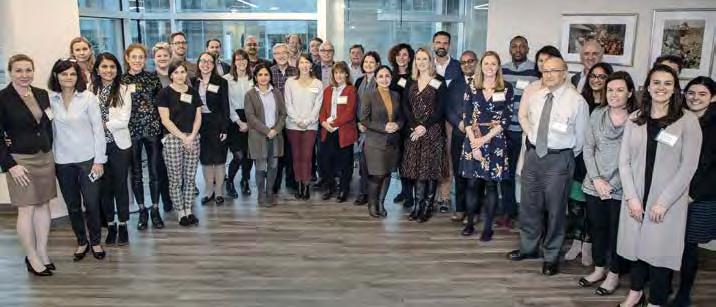
4 minute read
0
from Sight and Life Special Report | Focusing on Multiple Micronutrient Supplementation in Pregnancy
© Kevin Hage / Getty Images for Gates Archive
The launch of the Healthy Mothers, Healthy Babies Accelerator
Advertisement
Background
While the evidence is clear that MMS for pregnant women significantly decreases the risk of low birth weight and very low birth weight,1–3 MMS is still not readily available in LMICs. Only a few countries have switched from iron and folic acid (IFA) supplements to MMS as the standard antenatal care (ANC) for pregnant women.
MMS is particularly important in LMICs because diets rich in micronutrients are often unavailable or unaffordable for women of childbearing age.3 The result is that women in LMICs have a higher risk of poor pregnancy outcomes than women in high-income countries.
To address this inequity, the Bill & Melinda Gates Foundation (Foundation) asked the Micronutrient Forum to lead the Healthy Mothers, Healthy Babies Accelerator, in order to advance the introduction and implementation of MMS over the next 3 years. The Accelerator project was launched at the 2019 Goalkeepers event in New York City.
Accelerators
Goalkeepers Accelerators bring together organizations from different sectors – including governments, the private sector, civil society and philanthropy – around common agendas for action, seeking to catalyze investments, expertise and innovation to drive further progress towards the SDGs.
Each Accelerator makes a commitment that goes beyond ‘business as usual.’ The Foundation provides a platform and global stage to catalyze progress towards reaching the SDGs through the Accelerators.
The Healthy Mothers, Healthy Babies Accelerator
The Healthy Mothers, Healthy Babies Accelerator leverages new investments from the private sector, philanthropies, NGOs and country leadership to: save lives, improve the health of millions of women and newborns, correct inequitable access to MMS and make progress towards the SDGs. From the outset, the Accelerator was building on strong momentum for MMS among donors, implementing agencies and governments who were ready to act.
Against this background, the Healthy Mothers, Healthy Babies Accelerator mobilized nearly US$50 million in financial and inkind contributions, and will, over the next 3 years, reach more than 17.5 million pregnant women and their newborns in more than 60 countries, through a mix of introductory and large-scale programs. More than 10 partners from the private sector, academia, civil society and the United Nations have already committed to:
∙ Increase demand to help women, providers and governments understand the benefits of MMS, establish markets and provide technical assistance to those considering adoption.
∙ Increase supply to ensure that a reliable, high-quality, cost-efficient and effective source of MMS is available to those who wish to access them.
∙ Increase the quality of service delivery by integrating supply and demand via context-specific solutions to effectively deliver MMS to women globally.
Progress and next steps
The next important pieces of work for the Healthy Mothers, Healthy Babies Accelerator are to:
1) widen the reach and broaden the scope of the Accelerator with additional partners and commitments;
2) track partners’ progress on commitments; and
3) advocate for MMS around the Accelerator themes of increasing demand, supply and service delivery quality during key global, regional and national events including the Micronutrient Forum Global Conference in November 2020, the Tokyo Nutrition for Growth (N4G) Summit 2020 and the 2020 Goalkeepers event.
What went well
The level of commitment and enthusiasm for Healthy Mothers, Healthy Babies was almost overwhelming. As a neutral, convening organization, the Micronutrient Forum was fortunate to work with all partners to bring this Accelerator together in a very short time. Four factors seem to have been instrumental to the Accelerator’s success.
Firstly, the Accelerator was an overnight success years in the making. So many organizations have been involved in conducting research and advocating for MMS adoption for many years – and even successfully exploring the implementation of MMS use in ANC services – that a communal chorus of support had built to a crescendo. A critical tipping point in the acceptance of MMS as a superior intervention compared with IFA alone came with the publication of two definitive meta-analyses outlining the safety and efficacy of MMS.
Secondly, a handful of nimble organizations willing to act fast (and on a large scale) in support of the Accelerator gave other participants the confidence to support the Accelerator.
Thirdly, there were many linkages and a shared sense of respect among the donor organizations. Rather than competing, organizations acknowledged each other’s strengths and focused on ensuring that the Accelerator benefited overall from each organization’s complementary skills and focus areas.
Finally, there was a clear call to action with a deadline, creating a sense of urgency. The Bill & Melinda Gates Foundation
© Melissa Cooperman / IFPRI
Stakeholders brought together by the Micronutrient Forum in Washington, DC, on 5–6 February 2020 to discuss the acceleration of the use of maternal micronutrient supplements











